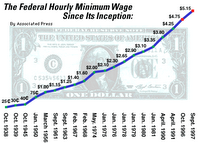Why Education Groups Should Rally For The Minimum Wage Increase
 The last time Congress raised the mininum wage was a long time ago, and the issue seems to be one of the first and most likely things for the new education committees to do -- especially since several states and cities have taken the lead in the intervening years and disproved the notion that the sky will fall if you raise the minumum (Election could drive minimum-wage hike).
The last time Congress raised the mininum wage was a long time ago, and the issue seems to be one of the first and most likely things for the new education committees to do -- especially since several states and cities have taken the lead in the intervening years and disproved the notion that the sky will fall if you raise the minumum (Election could drive minimum-wage hike). So what I'm wondering is whether a minimum wage increase is something that school reformers could -- and should -- get behind?
In high-poverty areas especially, a minimum wage increase means that parents have more time for their kids because they don't have to work two jobs. In theory, they make it to more teacher conferences. They help more with homework. They make sure the school is doing right by their kids. They have time to improve their own education.
To be sure, it's not a direct means to school improvement, and many reformers will sit by, tapping their fingers, waiting for the more traditional education issues to come to the top of the calendar. Call me Richard Rothstein, I think it would be interesting and compelling if the education groups (not just the labor-affiliated teachers unions) got out of their foxholes and did something with broader, if more diffuse, ramifications -- especially since they're likely to have to wait until the minimum wage issue is decided anyway.

5 Comments:
I think it works the other way. When entry-level wages go up, more teens drop out of school.
Of course, if the minimum-wage increases depresses the number of entry-level jobs than maybe drop-outs couldn't find jobs and would stay in school by default.
-- Joanne Jacobs
Well, there is scholarly work on precisely this question. Chaplin, Turner, & Pape (2003) in the Economics of Education Review estimated the effects of higher minimum wages on school enrollment using CCD.
From the abstract: "[W]e find some evidence that higher minimum wages reduce teen enrollment in states where students can drop out before the age of 18. This appears to be driven by the grade 9 to grade 10 transition. We find no effects for higher-grade levels or in states where students cannot drop out until they are 18. This suggests that minimum wages may have a substantial effect on teens' schooling effort in these early grades but also that these unintended effects can be offset by policies that encourage continued school enrollment."
This isn't my area of expertise, but it would seem that in certain policy environments (i.e., those with mandatory school enrollment until age 18), a higher minimum wage need not lead to a higher dropout rate.
Jacob Mishook
what about the other part, though, the impact of family income on student achievement and attainment? sure, higher wages might pull some older students out of school, i can see the possibility of that. but isn't there likely to be a strong countervailing effect of higher family income?
If government-mandated minimum wages can really work, why stop at a few buck-an-hour increase, and instead mandate a minimum of $50/hour for all jobs? And while we're at it, why not start imposing government-enforced price maximums? We could impose $1/gal minimum on petro, $100/apple computer, and $200/university credit hour.
I competely agree with you - and there was acutally a study done with children on an Indian reservation, pre and post gambling revenues coming to their familes, and one effect of higher incomes was greater school achievement. It is almost impossible to do such a study using the same familes - but in this case it was able to be done. I think this study underlines the logic of your argument.
Post a Comment
<< Home